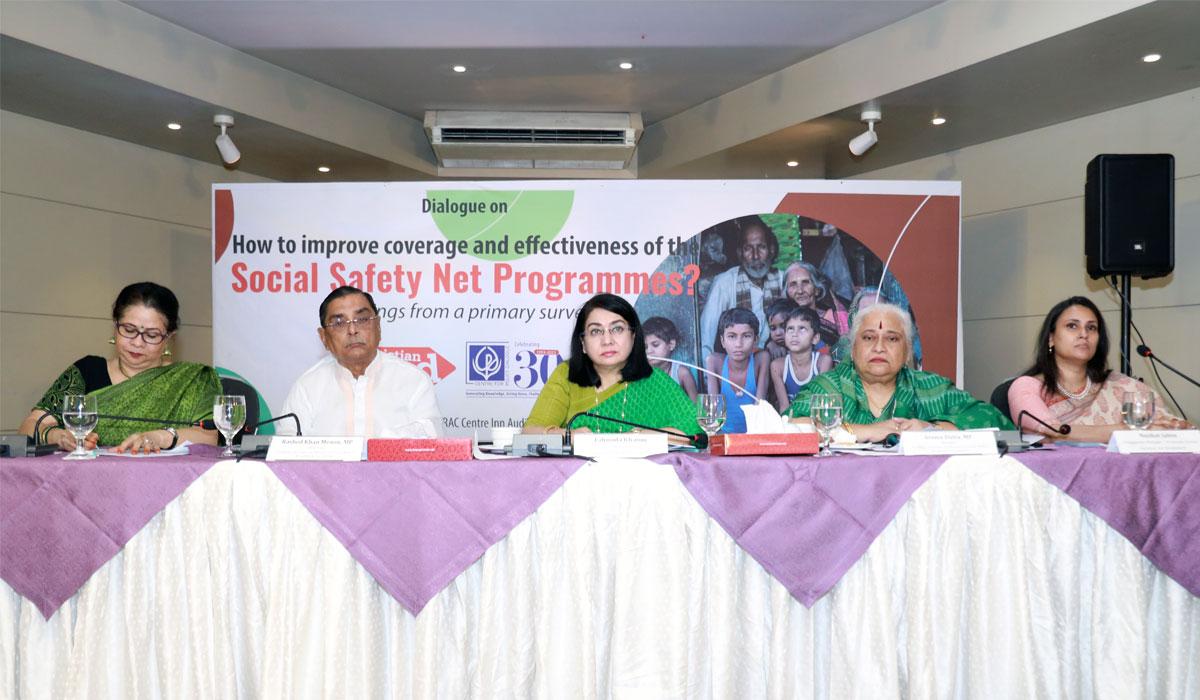
An additional BDT 4300 crores is needed to cover the eligible non-beneficiaries of three targeted social safety net programmes (SSNP) which include old age and widow allowance, and primary student stipend. The amount of BDT 1500 crores can be utilised from the current fund allocation if spending on non-eligible beneficiaries is discontinued. These are some of the findings that emerged from the study titled ‘Estimating Gap of the Social Safety Net Programmes in Bangladesh: How Much Additional Resources Required for Comprehensive Social Inclusion?’ conducted by the Centre for Policy Dialogue (CPD) in partnership with Christian Aid. This study was based on findings of a primary survey, Focus Group Discussions (FGDs) and Key Informant Interviews (KIIs).
In the above context, the dialogue titled ‘How to improve coverage and effectiveness of the Social Safety Net Programmes?: Findngs from a primary survey’ was jointly organised by CPD and Christian Aid on Sunday, 30 April 2023, at Brac Centre Inn, Dhaka.
Dr Fahmida Khatun, Executive Director of CPD, chaired the session and said ‘Identifying eligible beneficiaries and ensuring proper fund allocation in SSNPs is vital to support those in need and prevent wastage of limited government resources’.
‘Enhancing SSNPs is crucial for supporting the poor and achieving SDG 10, which aims to reduce inequality and leave no one behind.’ said Ms Nuzhat Jabin, Programme Manager, Economic Justice, Christian Aid Bangladesh in her introductory remarks.
In his keynote presentation, Dr Khondaker Golam Moazzem, Research Director of CPD, said “To meet the needs of the current beneficiaries, an extra BDT 39,862 crores is required for universal coverage for the targeted three programmes. This amount can be managed if the government prevents yearly tax loss (estimated at BDT 41 thousand crores to BDT 223000 crores according to another CPD-CA study).
While discussing the findings of the survey, the Research Associate, Mr ASM Shamim Alam Shibly, said ‘The beneficiaries have to pay BDT 500 to BDT 6000 as bribe so that they can avail for SSNP allowances’.
The study found that about 30 per cent of the elderly beneficiaries and 33 per cent of the widow beneficiaries are ineligible for SSNP allowances. Of these, around 12 per cent are getting multiple allowances such as pension support. ‘This leakage amount can be spent to cover an additional 45 per cent of eligible non-beneficiaries’, recommended the Research Director, Dr Moazzem.
He also highlighted that, to increase coverage, proper household identification is crucial. A thorough survey should be conducted in poverty-prone areas to identify the poor and vulnerable households, and a committee of public and private sector stakeholders, including local officials, should oversee this activity.
The Chief Guest, Mr Rashed Khan Menon, MP, Chairman, Standing Committee on Ministry of Social Welfare, Bangladesh Parliament, said ‘The SSNPs should not be viewed as a form of charity but as basic human rights’. He also opined that the allowance for freedom fighters should not be included in the SSNPs as they are respected citizens of the country.
Ms Aroma Dutta, MP, Member, Standing Committee on Ministry of Social Welfare, Bangladesh Parliament, Special Guest, said the SSNPs require a huge amount of investment and urged that the Non-Government Organisations (NGOs) and Civil Society Organisations (CSOs) should also try to invest in SSNPs so that its coverage can be increased.
Ms Rasheda K Choudhury, Former Advisor to the Caretaker Government and Executive Director, CAMPE said ‘It is important to increase awareness among citizens about SSNPs so that they can apply for the allowance and receive the necessary support to improve their living conditions.’
‘Incorporating face identification and palm impression technology, in the process of providing allowance, can help ensure that only eligible beneficiaries receive their allowance.’ said by one of the distinguished discussants, Dr Md. Moktar Hossain, Director, Social Security, Department of Social Services, Government of Bangladesh.
‘Rather than expanding the coverage of SSNPs by either adding new programs or increasing the number of beneficiaries in existing programs, the focus should be on improving the existing system’ said Dr Bazlul Haque Khondker, Professor, Department of Economics, University of Dhaka.
Dr Mohammad Abu Eusuf, Professor, Department of Development Studies, University of Dhaka, suggested redefining the selection process and criteria for eligible beneficiaries to prevent selection bias.
In the open floor discussion, the participants said that the transgender and the sex workers should be included in the SSNPs. It should also include allocating funds to improving the lives of disabled people. Pensions for retired government employees and interest payments for savings certificates should be excluded in the SSNPs.
High-level policymakers, political leaders, academics, development practitioners, civil society activists, and journalists attended the dialogue and participated actively.


